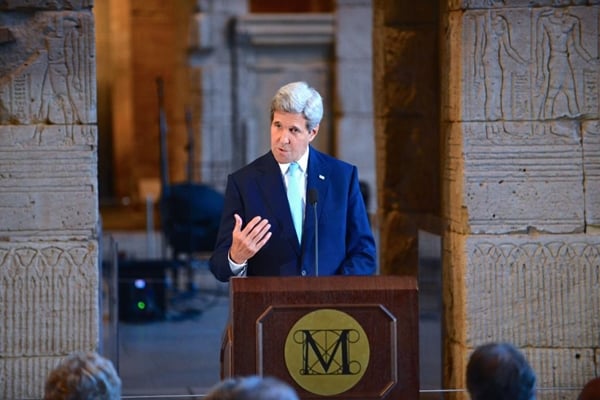Law & Politics
John Kerry Blasts ISIS’s Cultural Destruction in Met Speech

Photo: Department of State, via Twitter.

Josh Niland

The Metropolitan Museum gave John Kerry a soapbox.
The US Secretary of State spoke to an audience in the Met’s Temple of Dendur wing Monday night, laying out the justification for military intervention in the interest of protecting cultural heritage sites in Iraq and Syria just hours before the US and its allies commenced airstrikes against the Islamic State of Iraq and the Levant (ISIL, or ISIS) near Raqqa.
“ISIL is not only beheading individuals; it is tearing at the fabric of whole civilizations,” Kerry told the audience. “Far from hiding their destruction of churches and mosques, they broadcast these, purposefully and with pride, for all the world to see their act of depravity and for all of us to be intimidated and to perhaps back off from our values. For the proud people of Iraq and Syria—ancient civilizations, civilizations of great beauty, great accomplishment, of extraordinary history and intellectual achievement—the destruction of their heritage is a purposeful final insult, and another example of ISIL’s implacable evil. ISIL is stealing lives, yes, but it’s also stealing the soul of millions.”
Kerry’s statement followed remarks by Met director Thomas P. Campbell, who also underscored the importance of intervening on behalf of long-term cultural interests, saying that “cultural heritage and its preservation have a direct link to human understanding.”
Kerry is in town this week for the UN Climate Summit and was joined at the museum by UNESCO’s Director General Irina Bokova and professor Michael Danti of Boston University, who provided historical context for the audience with a presentation on the region’s archaeology.
The event comes just months after the militant group swept through large swaths of northern and central Iraq on a campaign of violence whose targets were not just rival factions and the Iraqi military but also various shrines and cultural sites in and around areas populated heavily by Shiite Muslims and other religious minorities (see “ISIS Destroying Iraq’s Cultural Heritage One Site at a Time“). In July, the group destroyed the tomb of Jonah (see “ISIS Militants Demolish Jonah’s Tomb in Iraq“), home to an important figure in both Islamic and Christian traditions, the prophet Jonah (or Younis), as part of a spate of violence against cultural sites around Mosul, a city in the country’s north which has been home to some of the worst fighting in the region this summer since hostilities began.
Kerry’s attempt to draw a line from the impetus of culture preservation to the necessity of military force used to insure its success may seem ancillary to the administration’s broad plans in regards to Iraq and Syria. But for now the State Department’s narrative remains clear—and those in the museum and cultural communities appear willing to give it a stage.